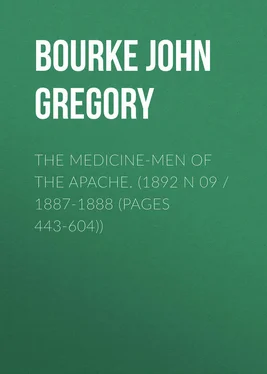John Bourke - The Medicine-Men of the Apache. (1892 N 09 / 1887-1888 (pages 443-604))
Здесь есть возможность читать онлайн «John Bourke - The Medicine-Men of the Apache. (1892 N 09 / 1887-1888 (pages 443-604))» — ознакомительный отрывок электронной книги совершенно бесплатно, а после прочтения отрывка купить полную версию. В некоторых случаях можно слушать аудио, скачать через торрент в формате fb2 и присутствует краткое содержание. Жанр: foreign_antique, foreign_prose, на английском языке. Описание произведения, (предисловие) а так же отзывы посетителей доступны на портале библиотеки ЛибКат.
- Название:The Medicine-Men of the Apache. (1892 N 09 / 1887-1888 (pages 443-604))
- Автор:
- Жанр:
- Год:неизвестен
- ISBN:нет данных
- Рейтинг книги:4 / 5. Голосов: 1
-
Избранное:Добавить в избранное
- Отзывы:
-
Ваша оценка:
- 80
- 1
- 2
- 3
- 4
- 5
The Medicine-Men of the Apache. (1892 N 09 / 1887-1888 (pages 443-604)): краткое содержание, описание и аннотация
Предлагаем к чтению аннотацию, описание, краткое содержание или предисловие (зависит от того, что написал сам автор книги «The Medicine-Men of the Apache. (1892 N 09 / 1887-1888 (pages 443-604))»). Если вы не нашли необходимую информацию о книге — напишите в комментариях, мы постараемся отыскать её.
The Medicine-Men of the Apache. (1892 N 09 / 1887-1888 (pages 443-604)) — читать онлайн ознакомительный отрывок
Ниже представлен текст книги, разбитый по страницам. Система сохранения места последней прочитанной страницы, позволяет с удобством читать онлайн бесплатно книгу «The Medicine-Men of the Apache. (1892 N 09 / 1887-1888 (pages 443-604))», без необходимости каждый раз заново искать на чём Вы остановились. Поставьте закладку, и сможете в любой момент перейти на страницу, на которой закончили чтение.
Интервал:
Закладка:
"Blood may be stanched by the words sicycuma, cucuma, ucuma, cuma, uma, ma, a." 47 47 Cockayne, Leechdoms, vol. 1, p. xxx.
There are numbers of these gibberish formulæ given, but one is sufficient.
"The third part of the magic 48 48 "The belief in the magic power of sacred words, whether religious formulas or the name of gods, was also acknowledged [i.e., in Egypt] and was the source of a frightful amount of superstition… The superstitious repetition of names (many of which perhaps never had any meaning at all) is particularly conspicuous in numerous documents much more recent than the Book of the Dead." – Hibbert, Lectures, 1879, pp. 192, 193.
of the Chaldeans belonged entirely to that description of charlatanism which consists in the use of gestures, postures, and mysterious speeches, as byplay, and which formed an accompaniment to the proceedings of the thaumaturgist well calculated to mislead." 49 49 Salverte, Philosophy of Magic, vol. 1, p. 134.
Sahagun 50 50 Kingsborough, lib. 2, vol. 7, p. 102.
calls attention to the fact that the Aztec hymns were in language known only to the initiated.
It must be conceded that the monotonous intonation of the medicine-men is not without good results, especially in such ailments as can be benefited by the sleep which such singing induces. On the same principle that petulant babies are lulled to slumber by the crooning of their nurses, the sick will frequently be composed to a sound and beneficial slumber, from which they awake refreshed and ameliorated. I can recall, among many other cases, those of Chaundezi ("Long Ear," or "Mule") and Chemihuevi-Sal, both chiefs of the Apache, who recovered under the treatment of their own medicine-men after our surgeons had abandoned the case. This recovery could be attributed only to the sedative effects of the chanting.
Music of a gentle, monotonous kind has been prescribed in the medical treatment of Romans, Greeks, and even of comparatively modern Europeans. John Mason Goode, in his translation of Lucretius' De Natura Rerum, mentions among others Galen, Theophrastus, and Aulus Gellius. An anonymous writer in the Press of Philadelphia, Pa., under date of December 23, 1888, takes the ground that its use should be resumed.
The noise made by medicine-men around the couch of the sick is no better, no worse, than the clangor of bells in Europe. Bells, we are told, were rung on every possible occasion. Brand is full of quaint information on this head. According to him they were rung in Spain when women were in labor, 51 51 Popular Antiquities, vol. 2, p. 70.
at weddings, 52 52 Ibid., p. 160.
to dispel thunder, drive away bad spirits, and frustrate the deviltry of witches; 53 53 Ibid., p. 217.
throughout Europe on the arrival of emperors, kings, the higher nobility, bishops, etc., 54 54 Ibid., p. 218.
to ease pain of the dead, 55 55 Ibid., p. 219.
were solemnly baptized, receiving names, 56 56 Ibid., pp. 214, 215.
and became the objects of superstition, various powers being ascribed to them. 57 57 Ibid., p. 216.
Adair, who was gifted with an excellent imagination, alludes to the possession of an "ark" by the medicine-men of the Creeks and other tribes of the Mississippi country, among whom he lived for so many years as a trader. The Apache have no such things; but I did see a sacred bundle or package, which I was allowed to feel, but not to open, and which I learned contained some of the lightning-riven twigs upon which they place such dependence. This was carried by a young medicine-man, scarcely out of his teens, during Gen. Crook's expedition into the Sierra Madre, Mexico, in 1883, in pursuit of the hostile Chiricahua Apache. Maj. Frank North also told me that the Pawnee had a sacred package which contained, among other objects of veneration, the skin of an albino buffalo calf.
There are allusions by several authorities to the necessity of confession by the patient before the efforts of the medicine-men can prove efficacious. 58 58 "When the Carriers are severely sick, they often think that they shall not recover, unless they divulge to a priest or magician, every crime which they may have committed, which has hitherto been kept secret." – Harmon's Journal, p. 300. The Carriers or Ta-kully are Tinneh.
This confession, granting that it really existed, could well be compared to the warpath secret, which imposed upon all the warriors engaged the duty of making a clean breast of all delinquencies and secured them immunity from punishment for the same, even if they had been offenses against some of the other warriors present.
The Sioux and others had a custom of "striking the post" in their dances, especially the sun dance, and there was then an obligation upon the striker to tell the truth. I was told that the medicine-men were wont to strike with a club the stalagmites in the sacred caves of the Apache, but what else they did I was not able to ascertain.
Under the title of "hoddentin" will be found the statement made by one of the Apache as to the means employed to secure the presence of a medicine-man at the bedside of the sick. I give it for what it is worth, merely stating that Kohl, in his Kitchi-Gami, if I remember correctly, refers to something of the same kind where the medicine-man is represented as being obliged to respond to every summons made unless he can catch the messenger within a given distance and kick him.
There is very little discrepancy of statement as to what would happen to a medicine-man in case of failure to cure; but many conflicting stories have been in circulation as to the number of patients he would be allowed to kill before incurring risk of punishment. My own conclusions are that there is no truth whatever in the numbers alleged, either three or seven, but that a medicine-man would be in danger, under certain circumstances, if he let only one patient die on his hands. These circumstances would be the verdict of the spirit doctors that he was culpably negligent or ignorant. He could evade death at the hands of the patient's kinsfolk only by flight or by demonstrating that a witch had been at the bottom of the mischief. 59 59 For identical notions among the Arawaks of Guiana, Tupis of Brazil, Creeks, Patagonians, Kaffirs, Chiqnitos, and others, see the works of Schoolcraft, Herbert Spencer, Schultze, and others.
Medicine-men, called "wizards" by Falkner, sometimes were killed by the Patagonians, when unsuccessful in their treatment, and were also obliged to wear women's clothing. They were selected in youth for supposed qualifications, especially if epileptic. 60 60 Extract from the Jesuit Falkner's account of Patagonia, in Voyages of the Adventure and Beagle , London, 1839, vol. 2, p. 163.
In Hispaniola we are told that when a man died his friends resorted to necromancy to learn whether he had died through the neglect of the attending medicine-man to observe the prescribed fasts. If they found the medicine-man guilty, they killed him and broke all his bones. In spite of this the medicine-man often returned to life and had to be killed again, and mutilated by castration and otherwise. 61 61 "Nul de ces médecins ne peut mourir si'ls ne lui enlevent les testicules." Brasseur de Bourbourg, Trans. of Fra Roman Pane, Des Antiquités des Indiens, Paris, 1864, p. 451.
Herrera repeats the story about a patient who died and whose relatives felt dissatisfied with the medicine-man:
Para saber si la muerte fue por su culpa, tomaban el çumo de cierta Ierva, i cortaban las vñas del muerto, i los cabellos de encima de la frente, i los hacian polvos, i mezclados con el çumo, se lo daban à beber al muerto por la boca, i las narices, i luego le preguntaban muchas veces, si el Medico guardò dieta, hasta que hablando el demonio, respondia tan claro, como si fuera vivo, i decia, que el Medico no hiço dieta, i luego le bolvian à la sepultura.
Читать дальшеИнтервал:
Закладка:
Похожие книги на «The Medicine-Men of the Apache. (1892 N 09 / 1887-1888 (pages 443-604))»
Представляем Вашему вниманию похожие книги на «The Medicine-Men of the Apache. (1892 N 09 / 1887-1888 (pages 443-604))» списком для выбора. Мы отобрали схожую по названию и смыслу литературу в надежде предоставить читателям больше вариантов отыскать новые, интересные, ещё непрочитанные произведения.
Обсуждение, отзывы о книге «The Medicine-Men of the Apache. (1892 N 09 / 1887-1888 (pages 443-604))» и просто собственные мнения читателей. Оставьте ваши комментарии, напишите, что Вы думаете о произведении, его смысле или главных героях. Укажите что конкретно понравилось, а что нет, и почему Вы так считаете.












